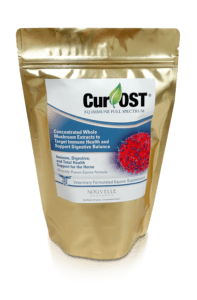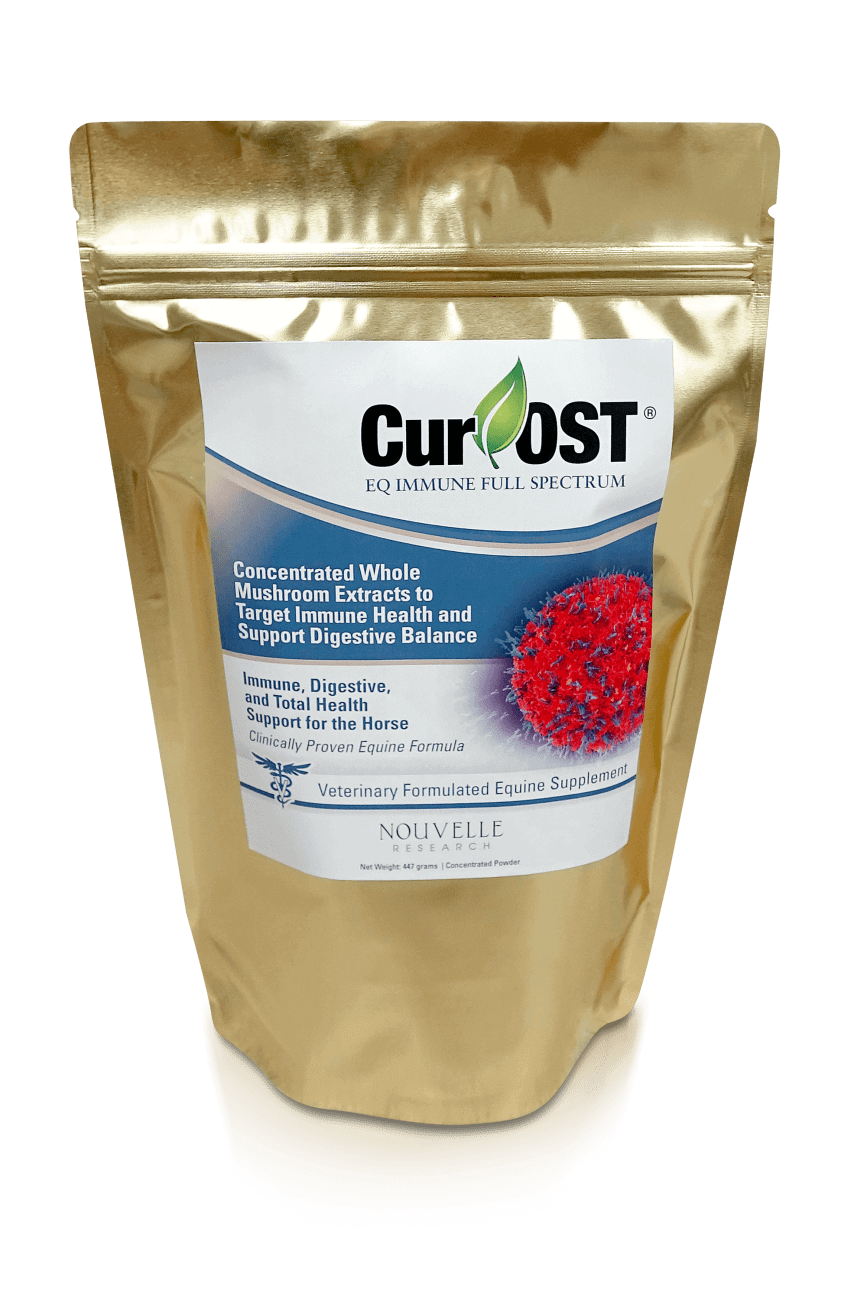The horse’s immune response is a very important factor to their overall health and well-being, not to mention soundness. All too often, as owners and even veterinarians, we often overlook this key element to their health, and only see a problem in the immune response when a health ailment is present. The fact is that the equine immune response is deeply woven into the fabric of their health. Proper support of the horse’s immune response is vital each and every day, but there are different approaches each with their own pluses or minuses. From preventing infections to aiding in recovery from illness, joint and even tendon health, your horse’s immune response is a critical component.

Medicinal mushrooms are a staple in Chinese and oriental medicine, and have been for centuries. They are often not used to ‘boost’ the immune response, although this is a positive benefit, but more so, they are used for their individual benefits with the goal of helping the patient to reacquire their health.
Key Benefits of Mushrooms in the Horse:
- Immunomodulation
- Adaptogens and stress reducers
- Rebuild the body
- Impact digestive health
The thing about mushrooms is that each can have their own touted benefits and ‘energies’. At a root level, most provide significant benefits regarding immune health and even inflammation reduction, but not every mushroom is beneficial to every horse or patient. This gets into understanding alternative medicine, foods, herbs, patterns present in the horses, and energies present in those substances. On a basic level, most mushrooms do impact the immune response and inflammation, but some can be warming, cooling, or neutral to the body. This implies that some can therefore be stimulating, while others more sedating or calming, or others no direct impact on energy or function. Your horse may desire one benefit but not the other!
Immune Capabilities of Mushrooms
Most medicinal mushrooms can directly impact the immune response, whether if that is in the horse or other species. Which mushrooms are beneficial? The list is extensive, but in my arsenal I include:
- Grifola frondosa (Maitake)
- Lentinula edodes (Shitake)
- Cordyceps sinensis
- Inonotus obliquus (Chaga)
- Poria cocos
- Coriolus versicolor (Turkey Tail)
- Ganoderma lucidum (Reishi)
In many research studies on the immune response, administration of various medicinal mushrooms over a few week’s time revealed a steady increase in natural killer cell (NK) numbers, alterations in levels of various inflammatory cytokines including interleukins, tumor necrosis factors (TNF), and levels of T-lymphocytes. (1)
The polysaccharides, specifically β-glucans, are one of the most versatile and ever present metabolites found often in high numbers within many medicinal mushrooms. This polysaccharide is believed to have many capabilities and impacts upon the body from alteration of the digestive microbiome to enhancement of the immune response. There are of course, many other ‘active’ phytochemicals present within the various mushrooms which also exert their huge benefits upon the body, the immune response, and the process of inflammation.
Some of the additional ‘active’ phytochemicals found in mushrooms include:
- Lentinan
- Hispolon
- Theanine
- Illudin
- Psilocybin
- Gandoderic acid
- Cordycepin
- Grifolin
- Anthroquinonol
- Krestin
- Lectin
Through these polysaccharides and other ‘active’ phytochemicals, medicinal mushrooms have research proven abilities to impact the immune response, helping to stimulate it in a time of need, while also helping to ‘quiet’ down or re-balance an overactive response. Additionally, much of their impact upon the immune system is through modulation of the inflammatory response. So, in many cases, there is also a direct lowering of inflammatory levels in the horse, which can benefit a multitude of conditions from an infection or wound, to a joint problem and lameness, or even thrush or ongoing foot problems.
Mushrooms: Adaptogenic and Building Benefits in the Horse
In alternative medicine, mushrooms are often not used for their direct immune support benefits, but more so, they are used as ‘tonics’. To be a ‘tonic’, this implies that a substance, be it a food or herb, helps to rebuild the body and restore balance, which then equates to health. Considering that upwards of 60% of all horses are under some form of stress, either mental or physical, this is a huge area of concern and an opportunity for intervention.
Many mushrooms, including Ganoderma and Cordyceps, are adaptogens, which implies they help to balance the stress response in the horse and other species. When you balance the stress response in your horse, you reduce the damage which can develop, or at least mitigate it. In addition, many other mushroom species are considered ‘tonics’ in the extent that they provide nutrients or phytochemicals that may assist in repair of tissue or rebuilding of the body. This could be strictly by nutrient provision or it could be direct impact on inflammatory processes that are present in the horse.
These benefits directly impact that horse that is contending with a tendon problem, a joint ailment, a sore back, or even a wound that just refuses to heal properly. All of those situations involve stress and an increased demand for support by tissues.
Mushrooms and Impact on Wounds and Injuries
Coming completely from personal experience, as a veterinarian, I have found extreme benefit from using medicinal mushrooms in cases where there is a wound, infection, or even an injury such as an injured tendon or muscle group. Why?
For starters, again, you have the impact of the ongoing process of inflammation in each one of those conditions. When the inflammatory event is more controlled and balanced, the body just tends to heal faster and more completely. This is like comparing literal chaos or peace and order when it comes to the immune response and orderly healing. The medicinal mushrooms help us to maintain that balance, keeping the immune response right where it needs to be to facilitate healing. In my experience, wounds and tendons recover about 50% quicker when using medicinal mushrooms, as compared to those horses that do not utilize them in their therapy. In addition, the healing is more complete and stronger.
Additionally, medicinal mushrooms, when used in their whole-mushroom form, provide many other macro- and micronutrients from protein to vitamins and minerals which support tissue health and healing. They can be used often as a source of ‘food’ and with that, nutrition. This helps to support the horse’s body.
Mushrooms and Digestion in the Horse
One major benefit to the use of mushrooms in the horse is the direct impact on digestive health. This was one of the first things I noted in my equine patients that were hospitalized for various reasons. Through daily use of the mushroom blend (EQ Immune Full Spectrum), we noted a change in the color, consistency, and odor to their feces. This was mainly due to the prebiotic properties of the mushrooms and the impact they had on the local microbiome and immune response.
Going Beyond Normal Capabilities with Mushrooms
Putting aside the immune, inflammation, and even wound healing properties that whole-medicinal mushrooms can offer, let’s dig into other benefits noted from just a couple for comparison purposes. It is relatively safe to say that all medicinal mushrooms provide the ability to impact the immune response, inflammation and speed wound healing time, but some mushrooms are just better than others, which may be related to potency and other phytochemicals mentioned above.
However, putting all of that aside, what else do medicinal mushrooms have to offer the average horse?
Every food and every herb possesses energetics, which is discussed in my online course. For most foods and herbs, you can actually classify their ‘temperature’, which may be hot, warm, neutral, cool, or cold. This inherent temperature to the herb is not noted in touch, but the impact which it creates in the body, no different than eating a watermelon versus eating a hot pepper. The energies in the food or herb often directly impact the horse’s well-being and health.
Point out two examples, let’s look at Cordyceps sinensis and Ganoderma lucidum. Both of these mushrooms have abilities to impact the immune response, inflammation, and boost overall recovery, but their other benefits are quite different.
Cordyceps sinensis is a warmer medicinal mushroom by nature and as a result of this quality, is very well known as an adaptogen and stimulant on some levels, helping to raise testosterone levels, increase energy and impact circulation. This is due to the ‘warming’ effect upon the body and in some cases, can create a sense of ‘dryness’ to the horse.
Ganoderma, on the other hand, is more cooling in nature, and as a result of this inherent nature, it is often well-known for its ability to impact stress, quiet the nerves and settle anxiety. Thus, it has a more cooling effect or calming effect upon the body. In very high doses, it can be almost hallucinogenic to an extent and induce rest or sleep.
Two totally different spectrums of impact upon the horse and one horse may desire an increase in energy, while another may benefit from a quieting effect.
Medicinal Mushrooms and Proper Balance for Optimal Effects on the Horse
Taking into consideration the numerous benefits that medicinal mushrooms can offer the horse, there are a few points to be raised regarding their usage.
First, ideally, they are used in combinations. The reason for this is that you wish to take advantage of the many capabilities and phytochemicals that may be present within many versus just one or two. The second reason is that as noted above, each has it’s own energies. If you focus on one, such as just Cordyceps, you could create an imbalance within your horse and with that, more harm than good. A proper, balanced blend, is generally more suitable for routine purposes in most equine cases. A blend that I prefer is found in our Cur-OST EQ Immune Full Spectrum.
Second, comes the question of when and how to use them. These medicinal mushrooms can provide real benefits and value to the average horse with an infection, allergies, injury, debilitation, or overall fatigue or exhaustion. They can also benefit many horses when it comes to digestive health and an imbalanced microbiome. All cases of EPM and Lyme disease benefit immensely, as do typical cases of skin conditions and even eye problems. There is even some noted benefit in cases of metabolic syndrome and laminitis, likely due to their impact on inflammation and digestive health.
In regards to ‘how to use them’, if there are active problems in any given horse, I will tend to use higher doses once to twice daily to support the recovery period. After the horse is doing better, I will tend to reduce those doses by 50% and administer once daily. Even after full recovery, and in the perceived ‘normal’ horse, I do not hesitate at all to keep them on a low dose, usually 25% of the label dose, once daily for overall health and immune support.
Medicinal mushrooms can be a powerhouse of protection and greatly assist in the recovery of the horse under many circumstances. These medicinal gems are often overlooked and sadly just relied upon for a short period to get a horse through a rough spot. If mushrooms were relied upon more often and used correctly, the benefits to the average horse could be huge!
Author: Tom Schell, D.V.M, CVCH, CHN
References:
- Patel S, Goyal A. Recent developments in mushrooms as anti-cancer therapeutics: a review. 3 Biotech, 2012, 2:1-15


